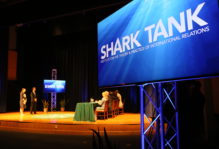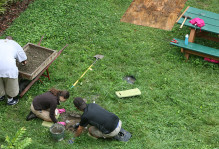It’s Official: SHC is MANOS
Some of our friends in Cuje, Nicaragua have told us that “SHC” is awkward to say in Spanish. Perhaps as important, student members of the project have worried that our name (Students for Healthy Communities) did not say very much about who we are, what we do, or where we work. After some considerable exploration, led by Soyoung Hwang, the team voted for a new name: Medical Aid Nicaragua: Outreach Scholarship, or MANOS (“hand” in Spanish). We like the words because they say clearly what we do and a good bit about how we do it. We like the metaphorical acronym: a hand, extended in friendship.
The timing of the renaming is propitious. It symbolizes the significant advancement of the team’s efforts to articulate a vision, a mission, and a strategy. The basic outlines of the project have been in place since the beginning. Over time, we have discussed and debated what it means to partner with communities to advance efforts to improve community health. Traveling to the community to host clinics and to conduct ethnographic research over the past three years have yielded significant understandings of a role and an approach that seem ethically defensible, well-grounded empirically, and practically plausible. We want to understand the community (actually, a district comprising eight separate communities), to appreciate local wisdom, to identify and document health needs and resources, and to partner with communities to encourage and support small-scale strategies to improve health and health care. We believe in the power of empirical knowledge and cultural wisdom. We believe that collective efforts can be effective — even in the face of extremely limited financial resources.
So, we prepare to return to Nicaragua for the fourth year. Three of our continuing members have been away this semester: Gabriela Aris, studying in Brazil; Margaret Summers studying in Argentina; and Ashley Imgram doing research and service in Madagascar. We miss their brilliance and their energy. They will be back in the spring to help as we finalize research questions and protocols, logistical arrangements, and training. We are faced with critical methodological questions as we acknowledge that we are not moving quickly enough to describe the communities and their health needs and resources. The logistics of multiple mountain-tops, limited infrastructure, and sparse settlement have made data collection very difficult. Over the next few weeks, we will make decisions that will shape or work for some years to come: do we continue to collect data across communities, or do we focus on one community and leave the others until later? Either way, how do we make our data collection efforts more efficient without losing the careful, first-hand, and rich data that are critical to our understanding.
Watch this space for updates as we answer these questions and move forward in preparation for our next work in Cuje.



No comments.
Comments are currently closed. Comments are closed on all posts older than one year, and for those in our archive.